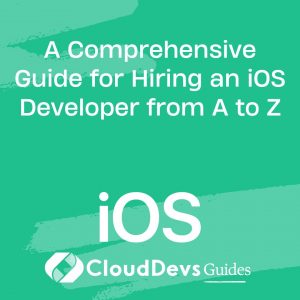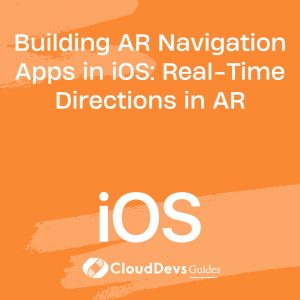A Comprehensive Guide for Hiring an iOS Developer from A to Z
We live in the 21st Century and this century is full of innovation, new technology, and digitalization, thus finding a skilled and visionary iOS developer is nothing short of essential. These developers serve as the architects of user-centric experiences that define our digital interactions. However, the journey begins with a remarkably crafted job description—one that doesn’t just list roles and qualifications but entices and excites potential candidates. Creating such a description requires more than mere words; it’s an art that fuses technical finesse, company culture, and transparent communication.
Table of Contents
1. Who is an iOS developer?
An iOS developer is a software developer who specializes in creating applications for Apple’s mobile operating system, iOS. iOS is the operating system that powers devices like iPhones, iPads, and iPod Touches. iOS developers use programming languages like Swift or Objective-C to write code for creating various types of applications, such as games, productivity tools, social media apps, and more.
These developers are responsible for designing, coding, testing, and optimizing iOS applications to ensure they run smoothly on Apple devices. They often work with Apple’s development tools and frameworks, such as Xcode and UIKit, to build user interfaces, handle user interactions, and integrate various features into their apps.
iOS developers need to stay up-to-date with the latest changes in the iOS ecosystem, as Apple regularly releases new versions of iOS with updated features and capabilities. This allows them to create apps that take advantage of the latest technologies and provide the best possible user experience on iOS devices.
2. What are the Advantages of Hiring an iOS Developer?
Hiring an iOS developer can bring several advantages to your business or project, especially if you are considering developing an app for Apple’s iOS platform.
We have listed out some of the key advantages of hiring an iOS developer such as;
- Expertise in Apple Ecosystem: iOS developers are well-versed in Apple’s development tools, frameworks, and guidelines. They understand the unique design principles and user experience expectations of iOS users, ensuring your app aligns with Apple’s standards.
- Access to High-Income Demographic: iOS devices, particularly iPhones and iPads, tend to be popular among users with higher disposable incomes. Developing an iOS app can give you access to a potentially lucrative user base.
- App Store Quality Control: Apple’s App Store has stringent quality control and review processes. An experienced iOS developer can navigate these processes effectively, increasing the likelihood of your app being approved and published without issues.
- Enhanced User Experience: iOS developers are skilled in creating intuitive, user-friendly interfaces that cater to Apple’s design philosophy. This can lead to better user engagement, retention, and positive reviews.
- Strong Security Measures: iOS has a reputation for robust security features. iOS developers are knowledgeable about implementing security best practices to protect user data and maintain the integrity of your app.
- Regular Updates and Compatibility: iOS developers stay updated with the latest iOS releases and ensure your app remains compatible with new versions. This helps you provide ongoing support and features to your users.
- Swift Performance: Swift is a modern programming language designed by Apple for iOS development. iOS developers proficient in Swift can create apps that are efficient, responsive, and performant.
- Monetization Options: If you plan to monetize your app, iOS offers various revenue models such as in-app purchases, subscriptions, and paid app downloads. An iOS developer can help you choose and implement the most suitable monetization strategy.
- Integration with Apple Services: iOS developers can integrate your app with various Apple services, such as Apple Pay, iCloud, and SiriKit, expanding your app’s capabilities and enhancing user convenience.
- App Store Visibility: Well-designed and well-developed iOS apps have a higher chance of being featured on the App Store, leading to increased visibility and potential downloads.
- Support for Multiple Devices: iOS developers can optimize your app to work across various Apple devices, including iPhones, iPads, Apple Watches, and Apple TVs, providing a consistent experience to users.
- Custom Solutions: An iOS developer can tailor the app development process to meet your specific business requirements and objectives, ensuring your app aligns with your brand and goals.
Overall, hiring an experienced iOS developer can help you create a high-quality, user-friendly app that aligns with Apple’s standards and provides a positive experience for your target audience.
3. What are the Main Tasks and Responsibilities of an iOS Developer?
The duties and obligations, and responsibilities and tasks of an iOS developer can differ based on factors like the particular project, team setup, and company requirements. Nonetheless, the subsequent tasks and responsibilities are frequently linked with the position of an iOS developer, as indicated by prevalent job platforms:
- App Conceptualization: Collaborate with stakeholders, designers, and product managers to understand app requirements, user needs, and business goals.
- Architecture Design: Plan and design the app’s architecture, including data structures, user flows, and technical components.
- Coding and Implementation: Write clean, efficient, and maintainable code using Swift or Objective-C, translating design concepts into functional features.
- User Interface Development: Create visually appealing and user-friendly interfaces that align with Apple’s design principles, ensuring a seamless user experience.
- Feature Development: Implement app features and functionalities based on the project roadmap, focusing on usability, performance, and innovation.
- API Integration: Integrate external APIs and services, such as social media platforms, geolocation, and payment gateways, to enhance app capabilities.
- Bug Detection and Resolution: Identify, troubleshoot, and resolve bugs and glitches through rigorous testing and debugging processes.
- Performance Optimization: Enhance app performance by optimizing code, reducing memory usage, and addressing any bottlenecks to ensure smooth operation.
- Version Control and Collaboration: Utilize version control tools like Git to collaborate with team members, manage code changes, and ensure codebase integrity.
- Cross-Device Compatibility: Adapt the app’s design and functionality to ensure consistent and optimal user experiences across various iOS devices.
- Data Management: Implement data storage solutions, such as Core Data or Realm, to effectively manage and organize app data.
- Networking and Data Fetching: Develop networking capabilities to communicate with servers, retrieve data from APIs, and update content in real time.
- Security Measures: Implement security protocols, data encryption, and authentication mechanisms to safeguard user information and app integrity.
- App Store Submission: Prepare the app for submission to the App Store, adhering to Apple’s guidelines and addressing any issues raised during the review process.
- Documentation and Comments: Maintain comprehensive code documentation and comments to facilitate code understanding, maintenance, and collaboration.
4. What are the Soft Skills an iOS Developer should have to deliver a good product?
Beyond technical expertise, the significance of soft skills becomes paramount when appraising an iOS developer. These proficiencies play a pivotal role in fostering seamless collaboration, adept issue resolution, and effective communication, rendering the developer a comprehensive and prized asset within your team.
Hence, we have mentioned some of the most essential soft skills to contemplate when evaluating an iOS developer.
- Communication Skills: Effective communication is key for collaborating with team members, sharing ideas, and explaining technical concepts clearly to non-technical stakeholders.
- Problem-Solving Ability: Strong problem-solving skills enable developers to analyze issues, identify root causes, and devise effective solutions, contributing to efficient development processes.
- Attention to Detail: Developers who pay attention to detail are more likely to write clean, error-free code and catch potential bugs before they become major issues.
- Adaptability: The ability to adapt to new technologies, programming languages, and development practices is crucial in the ever-evolving iOS ecosystem.
- Creativity and Innovation: Developers who think creatively can come up with unique solutions, novel app features, and engaging user experiences that set their apps apart.
- Time Management: Effective time management ensures that tasks are completed on schedule and deadlines are met, contributing to project efficiency.
- Collaborative Mindset: Being a team player, sharing knowledge, and collaborating effectively with designers, QA testers, and backend developers contribute to a harmonious development process.
- Empathy for Users: Developers who empathize with users’ needs and perspectives are more likely to create apps that provide meaningful and user-friendly experiences.
- Open-Mindedness: A willingness to consider new ideas, feedback, and alternative approaches fosters an environment of innovation and continuous improvement.
- User Experience (UX) Focus: Prioritizing the user experience and understanding how users interact with the app leads to intuitive and satisfying designs.
- Continuous Learning: A commitment to staying up-to-date with the latest iOS trends and technologies showcases a developer’s dedication to professional growth.
- Conflict Resolution Skills: The ability to handle conflicts constructively and find compromises ensures a positive and productive team atmosphere.
- Patience: Debugging and troubleshooting can require patience and persistence, leading to more thorough and effective issue resolution.
- Ownership and Accountability: Developers who take ownership of their work and hold themselves accountable for outcomes contribute to the overall quality of the app.
- Positive Attitude: A positive attitude can boost team morale, encourage collaboration, and contribute to a positive work environment.
5. Expert Tips for Hiring an iOS Developer
Remember that hiring an iOS developer is not just about technical skills; it’s also about finding someone who can collaborate effectively, adapt to your team’s dynamics, and contribute to the overall success of your app development projects.
- Define Your Requirements
Clearly outline the skills, experience, and qualifications you’re looking for in an iOS developer. Identify the specific project needs and the role the developer will play in your team.
- Review PortfoliOS
Ask candidates to showcase their past iOS projects, apps, and code samples. This helps you assess their coding style, UI/UX design skills, and the complexity of projects they’ve worked on.
- Technical Assessment
Conduct technical interviews or assessments to evaluate a candidate’s coding skills, problem-solving abilities, and familiarity with iOS development frameworks and tools.
- Check References
Contact references provided by the candidate to gain insights into their work ethic, teamwork, and overall performance on previous projects.
- Assess Soft Skills
Alongside technical skills, evaluate soft skills like communication, teamwork, problem-solving, and adaptability. These traits contribute to a developer’s effectiveness in a collaborative environment.
- Conduct Live Coding Sessions
Consider having candidates participate in live coding sessions or whiteboard exercises. This gives you a glimpse into their coding process, problem-solving approach, and ability to think on their feet.
- Review GitHub or GitLab Profiles
Check the candidate’s open-source contributions, personal projects, or repositories on platforms like GitHub. This provides insight into their coding habits, consistency, and willingness to share knowledge.
- Ask About Continuous Learning
Inquire about how candidates stay up-to-date with the latest iOS trends, tools, and best practices. Developers who prioritize ongoing learning tend to bring fresh ideas to your projects.
- Cultural Fit
Evaluate whether the candidate’s values and work style align with your company culture. A developer who fits well within your team’s dynamics is more likely to contribute positively.
- Provide a Test Project
Consider offering a small paid test project that simulates the kind of work the developer will be doing. This helps you assess their practical skills and their ability to work within your project’s scope.
6. Should you hire an in-house developer or a freelance developer?
The decision to hire an in-house iOS developer or a freelance iOS developer depends on various factors, including your project’s scope, budget, timeline, and specific requirements. Each option has its own advantages and considerations:
6.1 Hiring an In-House iOS Developer:
Advantages:
- Direct Collaboration: In-house developers work closely with your team, fostering better communication, collaboration, and integration with your company’s processes.
- Long-Term Commitment: In-house developers are likely to have a deeper understanding of your project’s goals and long-term vision, leading to more consistent and aligned development.
- Immediate Availability: In-house developers are available during regular working hours, making it easier to coordinate and address urgent issues promptly.
- Company Culture: In-house developers can become an integral part of your company’s culture, enhancing team dynamics and cohesion.
Considerations:
- Higher Costs: Hiring and maintaining in-house developers comes with costs like salaries, benefits, office space, and equipment.
- Recruitment Time: Finding and onboarding the right in-house developer can take time, potentially delaying project start dates.
- Limited Expertise: Your in-house team might have limitations in certain specialized areas, requiring additional resources for specific tasks.
- Hiring a Freelance iOS Developer:
6.2 Hiring a Freelance Developer:
If you hire a freelancer developer, you will gain the following advantages as well as to consider the following points as essential taglines for consideration.
Advantages:
- Cost Flexibility: Freelancers often have lower hourly rates than in-house developers, providing cost savings for smaller projects or specific tasks.
- Specialized Skills: Freelancers can be hired for specific skill sets or tasks, allowing you to tap into specialized expertise for certain aspects of your project.
- Short-Term Projects: Freelancers are suitable for short-term projects or tasks where you don’t need a full-time commitment.
- Broader Talent Pool: You can choose from a global pool of talent, potentially finding developers with unique perspectives and experiences.
Considerations:
- Communication Challenges: Freelancers might work remotely, which can lead to communication challenges and coordination issues, especially if not managed effectively.
- Limited Availability: Freelancers might have other commitments, leading to availability issues or slower response times.
- Less Control: Managing and overseeing remote freelancers might require additional effort to ensure quality and adherence to project timelines.
- Intellectual Property: Clear agreements are needed to ensure proper handling of intellectual property rights and confidentiality.
Accordingly, the choice between hiring an in-house iOS developer or a freelance iOS developer depends on your project’s specific needs and your company’s resources. For ongoing, complex projects with a need for consistent collaboration, an in-house developer might be more suitable. Freelancers can be a great fit for smaller projects, specialized tasks, or when budget constraints are a concern. Assess your project’s requirements, timeline, and budget to make an informed decision that aligns with your goals.
7. To Wrap Up
Hiring an iOS developer is not just recruitment; it is a strategic curation. A thoughtfully crafted job description blends technical precision with cultural resonance, sparking interest from top talent. Beyond technical prowess, soft skills are pivotal, fostering collaboration and communication. As digital landscapes evolve, iOS developers shape user-centric realities. It’s about finding a creative partner, skilled at navigating technology with finesse. This is more than hiring; it’s the start of a collaboration that drives innovative app experiences.
Table of Contents









